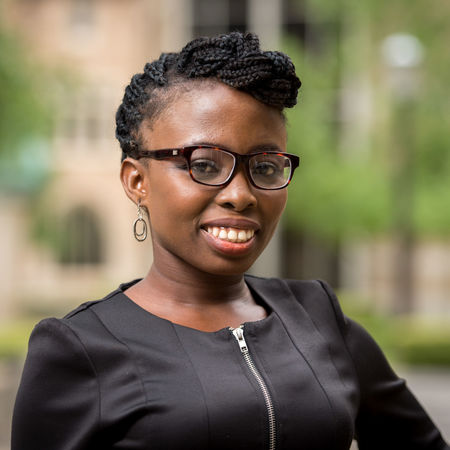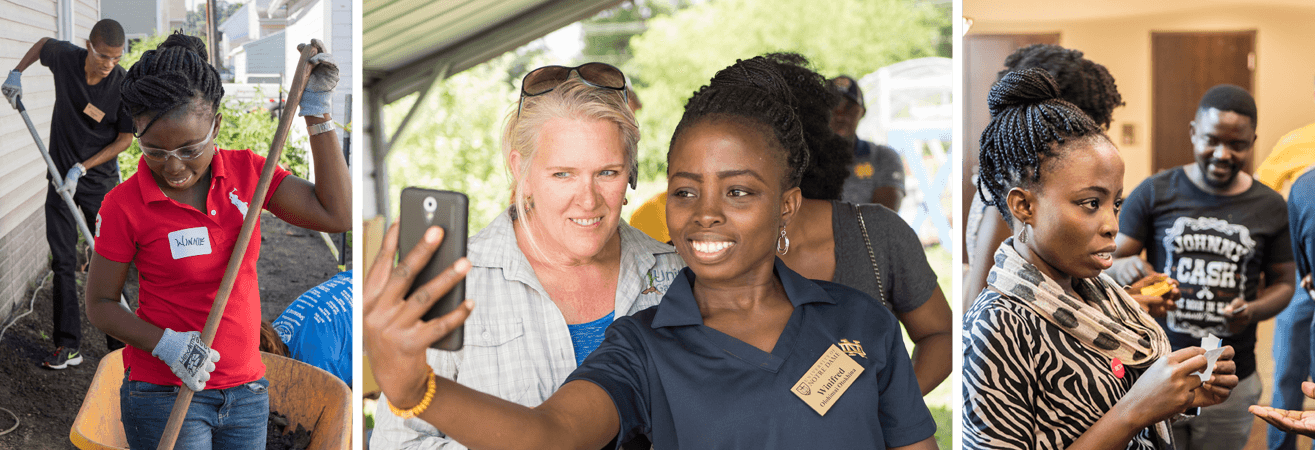
“It’s so sad that it’s all coming to an end,” says Winifred Otokhina from Nigeria, days from the end of the 2017 Mandela Washington Fellowship for Young African Leaders in late July on the campus of the University of Notre Dame.
Otokhina applied for the highly competitive program in 2016 during a particularly tumultuous time in her life, both professionally and personally. She was skeptical, at first, when her sister sent her information about the fellowship, thinking the program sounded too good to be true. However, after reading about the experiences of former Mandela Washington Fellows, including their interactions with former President Barack Obama, she decided to apply.
The application process, which lasted months, was often strenuous, but her sister and a good friend offered support and constant feedback until Otokhina felt confident enough to submit her application. In January of 2017 she was invited for an interview, something she did not expect to get. Six months later, Otokhina found herself on the Notre Dame campus, along with 24 other young African leaders from across the continent, participating in the six-week business institute brought to campus by the Notre Dame Initiative for Global Development (NDIGD).
Despite being nearly 6,000 miles away from home, Otokhina felt immediately at home at Notre Dame, due in part to her Catholic background. “I hoped to be sent to a campus where I could learn, but also build my faith,” she explains. “The community at Notre Dame has changed my perceptions of America; not everyone is secular, like I thought back home. There are many people that are spiritually-minded and focused, working each day to grow in their faith. It has really inspired me.”
Otokhina’s Catholic faith is an integral part of the work she does in Nigeria as an attorney specializing in insolvency and arbitration. She represents clients in court and provides legal aid to those who cannot afford it, seeing it as “giving a voice to the voiceless.” Through her church’s chapter of the Catholic Lawyers Association, she often takes part in pro bono activities.
"I do not want other families to experience preventable losses like what my family experienced."
Otokhina’s spirit of service extends further to a cause that is close to her heart: sickle cell disease (SCD) care and advocacy. Born into a family of seven, she lost two siblings, Anthony and Mary, to SCD at young ages when they were unable to get adequate treatment quickly. Fueled by their memory, Otokhina founded the Tonymay Foundation, named in their honor, to create awareness about SCD and address the lack of proper health management of the disease in Nigeria. “We provide care, advocacy, and research for those living with SCD,” she says. “We have 250 people that we take care of through the foundation. On the third Wednesday of every month, we operate a clinic where people can meet with a doctor, receive counseling, and have blood drawn and tested, all at no cost to them.”
Rates of SCD in Nigeria are among the highest in the world and Otokhina has made education and awareness about the disease integral to the foundation’s mission as well. “The United States and the United Kingdom have government policies on SCD, but Nigeria does not, so we work with the government to provide advocacy and help them develop a national policy,” she says. “I do not want other families to experience preventable losses like what my family experienced when we lost Anthony and Mary early in childhood. This is my heart’s work, my passion.”
Otokhina is optimistic that her Mandela Washington Fellowship experience will give her a platform to further engage Nigeria’s government on the issue of affordable healthcare. From her perspective, there is a clear cycle in the country. “It’s difficult for people to get a good job, so they have little money and SCD complications are often closely tied to poverty,” she explains. “The disease requires a lot of care and with no insurance or a government policy for care in place, people must self-fund their own care and that’s hard. It can take up to 80 percent of your income to care for yourself or your family members, and some families, like mine, have multiple people afflicted with the disease.”
 From left: Otokhina volunteering with Habitat for Humanity of St. Joseph County; taking a photo with Sara L. Stewart, president and executive director of Unity Gardens; and participating in the cross-cultural, experiential simulation, Bafa’ Bafa’.
From left: Otokhina volunteering with Habitat for Humanity of St. Joseph County; taking a photo with Sara L. Stewart, president and executive director of Unity Gardens; and participating in the cross-cultural, experiential simulation, Bafa’ Bafa’.
In addition to engaging with the government, Otokhina also hopes to take lessons from the fellowship and apply them to the Tonymay Foundation in order to strengthen its ability to serve as many people as possible. In the fellowship’s human-centered design course, taught by Christopher Stevens, an assistant teaching professor in the Mendoza College of Business, Otokhina reconsidered how she thinks about her foundation and its beneficiaries. “I realized that the actual needs of the beneficiaries of the foundation are the most paramount, rather than what I or my team thinks they need,” she explains. “For me to position the foundation to be more successful and expand, I need to ask and know what the beneficiaries need.”
Stevens’ words on leadership also had a profound impact on Otokhina. “He talked about the idea that no circumstance in life can deter you from being the person you want to be, or end up being,” she recalls. “I believe that everybody has their own story, whether good or bad, and it's the choice for you to make your story worthwhile or successful.”
Stevens found that the Mandela Washington Fellows had a similar profound impact on himself. “I was so inspired by the enthusiasm, the class, the commitment to learning, and the passion to use this experience as a great opportunity to become an even greater force for good in their home countries,” he says. “Winifred and her classmates worked so hard to seize this opportunity and make the best of it. No one should be surprised if five years from now we hear of several of these fellows playing a leading role in leading change in Africa. It was a true privilege to work with them all.”
The six-week fellowship has flown by, but Otokhina could not be more grateful for every day she has spent connecting with and learning from people like Stevens and her peers. “I hope future Mandela Washington Fellows know to look forward to coming to Notre Dame and South Bend. The University is packed with spiritual and intellectual excellence and offers the best experience that you could ask for from a fellowship,” Otokhina says. “I know America to be a beautiful place that everyone loves to visit, but I was scared that people would be unfriendly or uncaring, but the experience has been the total opposite. The faculty, staff, and everybody here wants to play a role in your life and you just feel at home.”
“I’m just grateful to God because he moved me upwards to this opportunity. I was totally depressed this time last year because things I was working on were not working out, but the fellowship has transformed my life and is the best thing that has happened to me this year,” she adds. “I am so grateful to President Obama for launching the fellowship in 2014. It takes one person to actually create a change and he does not know how many lives he has changed through this fellowship.”
With all she has learned and with the encouragement and support of the connections she has made, Otokhina is set to become a similar kind of change-maker when she returns home.
Lynn Miles Peisker manages projects for the multimedia team as part of the Marketing Communications division in the University of Notre Dame's Office of Public Affairs and Communications. She has a background in national marketing agency work, along with education and non-profit sector communication strategy.
The Notre Dame Initiative for Global Development — an integral part of the Keough School of Global Affairs at the University of Notre Dame — promotes human development and dignity among people worldwide through applied innovations, impact evaluation, education and training that help build just and equitable societies.